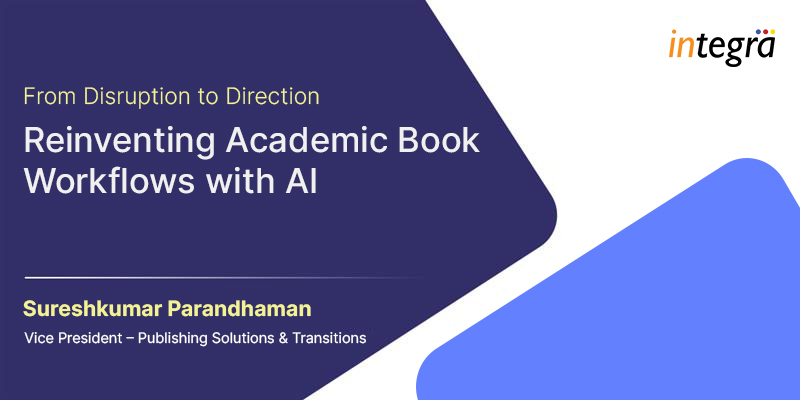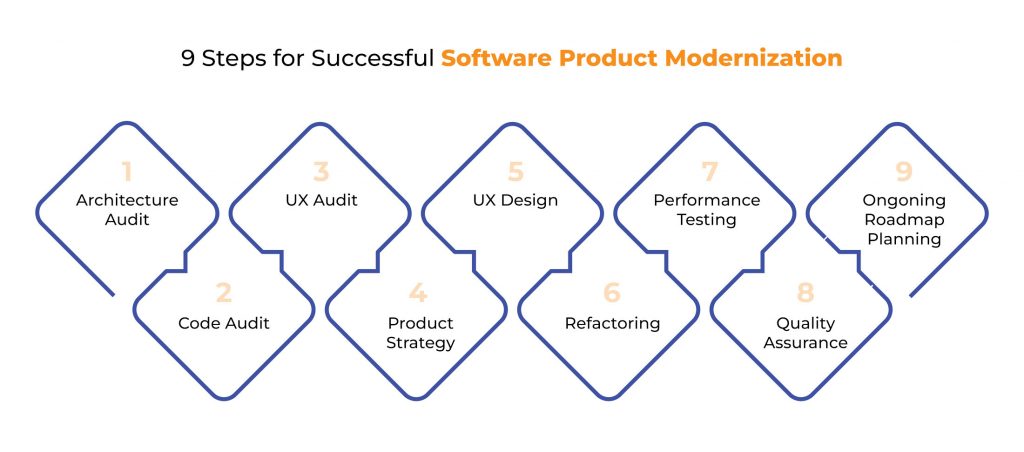Navigating Product Modernization Services: A Strategic Guide

In the rapidly evolving business landscape, the continuous modernization of products stands as a critical factor for sustaining competitiveness. Modernization isn’t just about keeping up with technology; it’s about reimagining products to meet the ever-changing market demands and customer expectations. A 2017 Oxford Economics study revealed that 84% of executives surveyed believe digital transformation is essential for their company’s survival over the next five years. However, only 3% have achieved complete digital transformation across their organization. Considering this, the application modernization market is currently at a pivotal moment and is expected to expand significantly, reaching an estimated market value of USD 24.8 billion by 2025.
Understanding Product Modernization
Product modernization refers to all changes that will increase the product’s value, functionality, and utility in the current market. Unlike simple improvements or changes, which are often superficial or incremental, modernization requires complete change, which can include technology, design, user experience and functionality Not continuity with technological advances but also a way of anticipating future trends and customer needs. For eg: Microsoft Office 365 stands as favoured productivity suite. In this iteration, Microsoft transitioned its software from traditional on-premise installation to a cloud-based platform, enhancing convenience and cost-efficiency for businesses. This shift enables teams to collaborate on documents and spreadsheets from any location globally.
Source: Software Product Modernization: Steps, Strategies & Benefits (rishabhsoft.com)
Benefits of Product Modernization
A product modernization process has several advantages and can result in major advancements for the product as well as the company overall. The following are some of the main benefits:
Enhanced User Experience: Improving a product’s functionality and user interface is a common step in modernizing it, and this can greatly improve the user experience. Increased customer satisfaction and loyalty result from this, since users value and choose utilizing items that are user-friendly, effective, and in line with emerging trends.
Enhanced Market Competitiveness: By updating your product, you make sure it continues to be competitive and relevant in a market that is constantly changing. As you continue to satisfy the shifting needs and expectations of your target audience, this aids in preserving and even growing your market share.
Operational Efficiency: A product can be made more effective and efficient by streamlining its many components through modernization. This may result in lower operating expenses, better output, and enhanced performance.
Leveraging New technology: This method enables you to include cutting-edge technology, such artificial intelligence (AI), machine learning, and cloud computing, into your product. With the help of these technologies, your product’s functionality and customer service potential can be increased.
Future-Proofing and Scalability: A modernized product is frequently more flexible and scalable to accommodate changes in the future. This implies that you won’t have to start from scratch when your product needs to be modified to satisfy new requirements as your organization expands or the market shifts.
Risk Mitigation: Outdated products may become incompatible with newer systems and technology or provide security threats. By guaranteeing that your product complies with the most recent security requirements and is compatible with contemporary technologies, modernization helps reduce these risks.
Improved Brand Image: A modernized product enhances your brand by giving off the impression that it is innovative and progressive. This can improve your brand’s reputation by drawing in new clients and keeping hold of current ones.
Assessing Your Product’s Modernization Needs
Before embarking on a modernization journey, it’s essential to conduct a thorough assessment of your product’s needs. This involves identifying critical areas where modernization can bring the most significant benefits, such as technology, user interface, and functionality. This assessment should not be conducted in isolation but should take into account prevailing market trends and customer feedback. Understanding what customers value in current offerings and what they expect in the future can significantly shape your modernization strategy.
Key Aspects of Assessment
- Technology Audit: Evaluate the current technological framework of your product. Are the technologies used outdated? Do they limit your product’s capabilities? Assessing the technology aspect can reveal opportunities for integrating more advanced and efficient solutions, such as cloud computing, AI, or IoT.
- User Interface and User Experience (UI/UX) Review: The user interface and overall user experience are crucial in determining how well your product is received by customers. Assessing these elements involves understanding whether the design and functionality align with modern user expectations, are intuitive, and provide a seamless experience.
- Functionality Analysis: Examine the core functionalities of your product. Determine if they meet the current needs of your market, and identify areas where enhancements could significantly improve performance or add new value for users.
- Market Trends and Competitor Analysis: Understanding current market trends and what competitors are offering can give insights into areas where your product might be falling behind. This analysis helps in aligning your modernization efforts with what the market demands and expects.
- Customer Feedback and Insights: One of the most valuable sources of information for assessing modernization needs comes from your customers. Analyze customer feedback, support queries, and usage data to identify pain points, unmet needs, and areas of potential improvement.
- Scalability and Future-readiness: Assess whether your product can scale to meet future growth and if it’s adaptable to upcoming changes in technology and market conditions. Products that are not scalable or adaptable may require significant modernization to avoid becoming obsolete.
- Compliance and Security Evaluation: Ensure that your product complies with relevant industry standards and regulations. Security is another critical aspect; assess whether your product has any vulnerabilities and if modernization can enhance its security features.
Choosing the Right Product Modernization Service
Choosing the right product modernization service is a critical step in your modernization journey. The criteria for selecting a service provider should include their expertise, track record, and approach towards modernization. It’s also essential to evaluate the compatibility of their proposed solutions with your existing systems and their scalability to accommodate future growth. Another crucial factor is the cost-effectiveness and long-term value of the service.
Implementing Modernization Effectively
Effective implementation of modernization strategies is key to realizing their benefits. This involves adhering to best practices for a smooth transition, managing expectations within your organization, and ensuring operational continuity during the modernization process. It’s also important to establish mechanisms for continuous evaluation and improvement post-implementation, allowing your product to adapt and evolve with changing market demands.
In summary, product modernization is an essential strategy for businesses looking to thrive in today’s fast-paced market. This guide has provided a detailed roadmap for navigating the complex landscape of product modernization services, emphasizing the importance of a strategic approach to modernization. By understanding the evolving market needs, carefully selecting service providers, and implementing modernization strategies effectively, businesses can ensure their products remain relevant and competitive.
Recent Blogs

Research Integrity vs. Publication Integrity: Clarifying Responsibility in Scholarly Publishing

From Disruption to Direction: Reinventing Academic Book Workflows with AI




